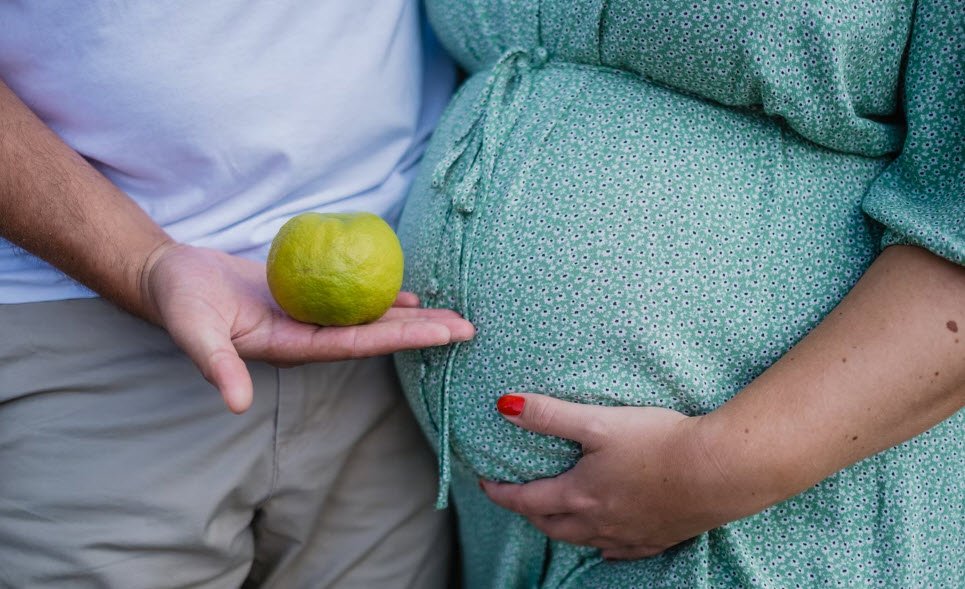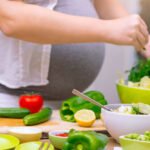It is recommended that all pregnant women take a daily vitamin supplement that contains 400 micrograms of folic acid and 10 micrograms of vitamin D in pregnancy.
Energy (calories) is needed for the growth and development of the baby. Most women do not need to have any additional energy above their normal needs until the final stage of pregnancy (weeks 27-40).
Energy is provided by the fat, carbohydrate, protein and alcohol in the foods and drinks we consume, but the main source of energy should be from carbohydrate foods such as potatoes, rice, pasta, bread, other grains and starchy root vegetables such as yam.
Protein is also needed for the growth and repair of tissues, but more is needed in pregnancy. Most adults in the UK get more than enough protein in their diets, and following the advice in this guide will ensure protein needs are met.
Protein is found in a wide variety of foods including cereals, dairy foods such as milk, yoghurt and cheese, meat, fish, poultry, nuts, seeds, eggs, peas, beans and pulses.
Fibre in the diet helps to prevent constipation and other bowel problems. Fibre is found in the indigestible parts of foods such as in wholemeal cereals and vegetables, beans and fruits.
Oligosaccharides are a component of dietary fibre and these encourage the growth of bacteria which are beneficial to the gut. Eating a good mixed diet will encourage these good bacteria to thrive, and there is no need to take a supplement which contains prebiotics or probiotics to do this.
Good sources of fibre include wholemeal bread, wholegrain breakfast cereals, peas, beans, lentils, vegetables, fresh and dried fruit and seeds.
Also Read: Foods To Eat and Food To Avoid In Pregnancy
Carbohydrates and fats also provide energy and other nutrients and pregnant women need to have them in the same proportions in the diet as for all adults. If the ideas for meals and snacks in this guide are followed, these will be consumed in about the right amounts.
1. Vitamin A
Vitamin A is needed for eye health, cell growth and to support the immune system. Extra vitamin A is needed during pregnancy, but too much of the animal form of vitamin A (retinol) can be toxic. 700 micrograms of vitamin A a day are recommended.
Safe sources of vitamin A can be found via carotenoids in some types of fruits and vegetables. Fish is a good source of vitamin A. Some types of animal products such as liver and liver pâté or liver sausage have high levels of vitamin A and should be avoided.
Intakes of retinol equivalents greater than 3,000 micrograms a day are considered potentially dangerous in pregnancy. This level of intake is most likely to come from supplements including the use of fish oils. A cod liver oil capsule containing 1,000mg or 1g of cod liver oil is likely to contain about 800 micrograms of retinol equivalents. A teaspoon of cod liver oil (5g) will therefore exceed the upper recommended level of 3,000 micrograms.
- Animal sources – butter, canned salmon, cheese, egg, full-fat milk, herrings, kidney, pilchards canned in tomato sauce and smoked mackerel
- Non-animal sources – apricots (dried, fresh or canned), blackcurrants, broad beans, broccoli, Brussels sprouts, cabbage (dark), canteloupe melon, carrots, honeydew melon, mango, margarine, nectarine, orange, peach, peas, prunes, red peppers, runner beans, spinach, sweet potatoes, sweetcorn, tomatoes and watercress
2. Riboflavin (Also called vitamin B2)
An additional amount of riboflavin is needed during pregnancy. 1.4mg of riboflavin a day is recommended in pregnancy. Riboflavin helps to release energy from food and is important for eye and heart health.
Many women get most of their riboflavin from animal sources and particularly dairy foods and so if they avoid these foods it is important that they regularly eat non-animal sources of riboflavin.
- Animal sources – bacon, cheese, eggs, kidney, lean meat or poultry, mackerel, milk, pilchards, salmon, sardines, tuna and yoghurt
- Non-animal sources – almonds, fortified breakfast cereals, granary bread, mushrooms, soya beans, spinach and wheatgerm bread
3. Folic acid
Folic acid is important before pregnancy and in the first few weeks of pregnancy to prevent neural tube defects, and in later pregnancy to prevent a particular type of anaemia. 400 micrograms a day are recommended.
Women should take a supplement of folic acid, but good sources of folic acid should also be included in any healthy diet.
- Animal Sources – broccoli, Brussels sprouts, cabbage, cauliflower, fortified breakfast cereals, green leafy salads, melon and oranges
- Non-Animal Sources – parsnips, peanuts, peas, potatoes, runner beans, spinach, tomatoes, wholemeal bread and yeast extract
4. Calcium
Calcium is important for bone health and, although calcium needs are increased in pregnancy, the body adapts to ensure more calcium is absorbed, so higher intakes are not needed. 700mg of calcium a day is recommended for women.
The exception to this is for teenagers in pregnancy where additional calcium is needed for the teenagers’ own growth. A regular intake of dairy products (milk, cheese and yoghurt) throughout pregnancy will ensure that calcium needs are met.
If women do not include these foods in the diet, it is important that they choose suitable alternatives.
- Dairy sources – cheese, cheese spread, yoghurt, fromage frais and milk
- Non-dairy sources – canned salmon, dried fruit, egg yolk, muesli, orange, peas, beans and lentils, pilchards, sardines, soya drink fortified with calcium, spinach, tofu and white bread/flour
5. Iron
Iron is important for the production of red blood cells and it supplies oxygen to the cells. Pregnant women are recommended to have 14.8mg of iron a day. Low iron status in pregnancy is associated with low birthweight babies and premature birth.
Suggested Read: Important Vitamins and Minerals For Pregnant Woman
All pregnant women will be screened at antenatal booking-in to see if they need to take an iron supplement in pregnancy. Encourage women to have this simple blood test if you think they might be anaemic.
Good sources of iron include red meat, fish, peas, beans and lentils, and leafy vegetables.
- Animal sources – beef, beefburger, chicken and other poultry, corned beef, egg, herrings, kidney, lamb, pilchards, salmon, sardines, sausage and tuna
- Non-animal sources – baked beans, blackcurrants, black-eyed peas, broad beans, broccoli, chick peas, dried apricots, fortified breakfast cereals, lentils, raisins, soya beans, spinach, spring greens, tofu, weet bisks, white bread, wholemeal bread/flour
6. Iodine
Iodine helps regulate metabolism and plays an important role within the thyroid in controlling many body processes. Pregnant women are recommended to have 140 micrograms of iodine a day.
Too little iodine in pregnancy is associated with learning disability in infants and children. Iodine deficiency is the biggest cause of mental retardation worldwide. The main source of iodine in the UK is dairy products.
Iodine can also be found in seaweed, fish and seafood. Smaller amounts can be found in meat and meat products and some types of vegetables (depending on the soil where they were grown).
If someone does not have dairy products and does not eat any fish or seafood, it is very important that they have other sources of iodine in their diet. It is also important not to have too much iodine, and intakes should not exceed 940 micrograms a day.
- Dairy sources – butter, cheese, fromage frais, milk, ice cream and yoghurt
- Non-dairy sources – egg, fish, fish paste, seaweed and shellfish
7. Zinc
Zinc plays a role in enzyme and insulin production, and is important for the baby’s health and development. Zinc helps to form the baby’s organs, skeleton, nerves and circulatory system.
The current recommendation for pregnant women is for 7mg of zinc a day. Some women may have too little zinc in their diet if they don’t eat well and if they don’t regularly have foods such as meat, fish, eggs, milk, pulses, nuts or cereal foods.
- Animal sources – bacon, canned sardines, canned tuna or pilchards, cheese, cold cooked meats, corned beef, eggs, ham, kidney, lean meat, milk, poultry, sausages and shrimps and prawns
- Non-animal sources – beans and lentils, brown or wholemeal bread, nuts, plain popcorn, sesame seeds, tofu and wholegrain breakfast cereals such as puffed wheat, branflakes or weet bisks
8. Long chain polyunsaturated fatty acids
Pregnancy causes physiological changes in women, which mean that many nutrients and other dietary components are absorbed more efficiently, or taken from the mother’s stores, so that the developing infant will not be deprived of nutrients.
There are some components – such as long chain polyunsaturated fatty acids (or omega 3 fatty acids), and choline – that the body can make itself in small amounts, but which it is helpful to have sufficient of in the diet during pregnancy. This is to ensure stores are not depleted and that the infant has sufficient for brain and cell development.
Long chain polyunsaturated fatty acids oil-rich fish, such as salmon, trout, herring, mackerel, sardines and pilchards
9. Choline
If women eat a variety of meals and snacks as recommended in this resource, it is likely that they will get enough choline and long chain polyunsaturated fatty acids to meet their needs.
- Sources – eggs, lean meat, some vegetables, such as green leafy, vegetables and peas, tomato paste, tofu, pulses and nuts and seeds
10. Energy
An additional amount of energy (calories) is needed during the final stage of pregnancy (weeks 27-40) to make sure the baby arrives at a good weight. Low birthweight is associated with more problems at birth, in the first few months and in later life. An extra 200kcal per day is recommended.
The best sources of energy are those that also provide other nutrients, for example:
- starchy foods such as potatoes, bread, pasta and rice
- dairy foods such as milk and yoghurt
- eggs.
11. Vitamin C
An additional amount of vitamin C is needed during the final stage of pregnancy to increase intakes to 50mg a day. Vitamin C is one of the building blocks for skin and also acts as an antioxidant and protects cells from damage. Eating a range of the meals and snacks shown in this resource will ensure enough vitamin C is consumed.
- Sources – apples, blackberries, blackcurrants, broccoli, Brussels sprouts, cabbage, canned guava, cauliflower, grapefruit, green and red peppers (raw), green beans, kiwi fruit, mango, nectarines, orange (and orange juice), peaches, peas, potatoes, raspberries, satsumas, spinach, spring greens, strawberries ,tomato and watercress
You may also read: [Pregnancy] How Your Baby Develops – Weekly Pregnancy Guide
12. Thiamin (Also called Vitamin B1)
An additional amount of thiamin is needed during the final stage of pregnancy to increase intakes to 0.9mg a day. Thiamin helps to release energy from food and plays an important role in the development of the baby’s nervous system.
- Animal sources – chicken and other poultry, eggs, lean meat, pork, bacon and ham
- Non-animal sources – fortified breakfast cereals, nuts, oatcakes, potatoes, white or brown bread, wholemeal bread and yeast extract



